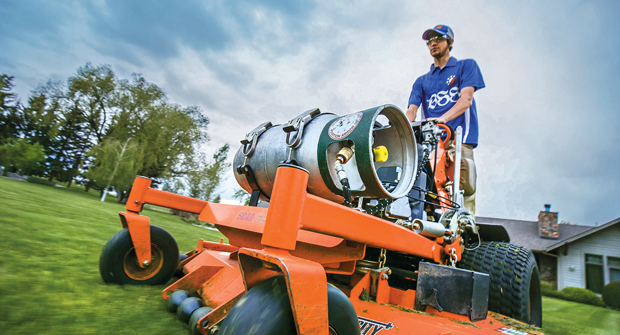Landscaping professionals face constant challenges with fluctuating fuel costs, increasing environmental regulations and the need for reliable equipment to keep operations efficient. As the industry continues shifting toward more sustainable practices, many landscape and lawn care companies recognize that updating their equipment is essential to staying competitive.
As a result, many are turning to propane-powered equipment — and for good reasons. From reducing emissions to lowering fuel costs and improving operational efficiency, propane provides a reliable, clean energy source that aligns with business and environmental goals.
Cost-effective operations
Profitability is key for any business, and contractors must make tough decisions to help improve their bottom lines. The cost of traditional fuels like gasoline and diesel can fluctuate, impacting budgets and increasing operational costs. Propane, however, offers a more stable and cost-effective alternative.
Unlike their gasoline-powered counterparts, propane-powered mowers can be refueled quickly on-site using portable cylinders, allowing crews to spend less time at gas stations and more time on the job. Additionally, propane burns cleaner than gasoline, leading to less carbon buildup in engines, reducing maintenance and extending equipment life.
Propane mowers also require a lower upfront investment than electric equipment, which often requires expensive charging infrastructure and has limited run times. The average propane mower costs between $8,000 and $12,000, making propane an accessible choice for businesses seeking value without sacrificing performance.
When fuel efficiency and reduced maintenance costs are factored in, the savings add up quickly over a season of heavy use. Many companies find that their propane-powered mowers pay for themselves within just a few seasons, making the investment even more worthwhile.
Reduced emissions
Environmental regulations are increasing worldwide, putting more pressure on businesses to reduce their carbon footprints. Propane helps landscape companies stay ahead of these regulations by offering a low-emission alternative that still delivers the performance and results they need for demanding jobs.
Compared to gasoline-powered mowers, propane mowers reduce greenhouse gas emissions by up to 17 percent, nitrogen oxides by 19 percent and sulfur oxides by 16 percent. Because propane mowers operate quieter and there are no gasoline spills to worry about, crews can work longer hours in noise-sensitive or environmentally regulated areas.
With more cities and states setting aggressive targets to reduce emissions, propane positions landscape businesses for long-term sustainability and regulatory compliance.
Productivity gains, enhanced safety
In the landscaping industry, every minute counts. Propane-powered mowers provide consistent power output throughout the workday, avoiding performance drops that can happen with gasoline engines as they heat up. Also, propane cylinders can be quickly swapped out in the field, eliminating downtime typically needed for refueling. Unlike mowers with gasoline engines, propane-powered equipment does not experience fuel degradation or carburetor problems, reducing repair-related downtime.
Safety, of course, is a top concern for landscaping companies. The use of propane is often accompanied by well-defined safety guidelines and training, helping crews understand proper handling, storage and emergency procedures.
Plus, businesses operating propane-powered mowers contribute to employee safety and well-being by ensuring better air quality. Fuels that produce fewer pollutants, like propane, can contribute to workers’ health and safety by minimizing health risks associated with inhaling harmful fumes. Propane also runs quieter, reducing noise pollution and improving working conditions.
Planning on propane?
The Propane Education and Research Council (PERC) offers a variety of tools and resources to support landscape professionals considering the switch to propane, including the Mower Cost Calculator. This easy-to-use tool helps businesses estimate potential savings by comparing propane to other fuel options.
To learn more about propane’s contributions to energy equity, environmental responsibility and economic savings, visit here.


